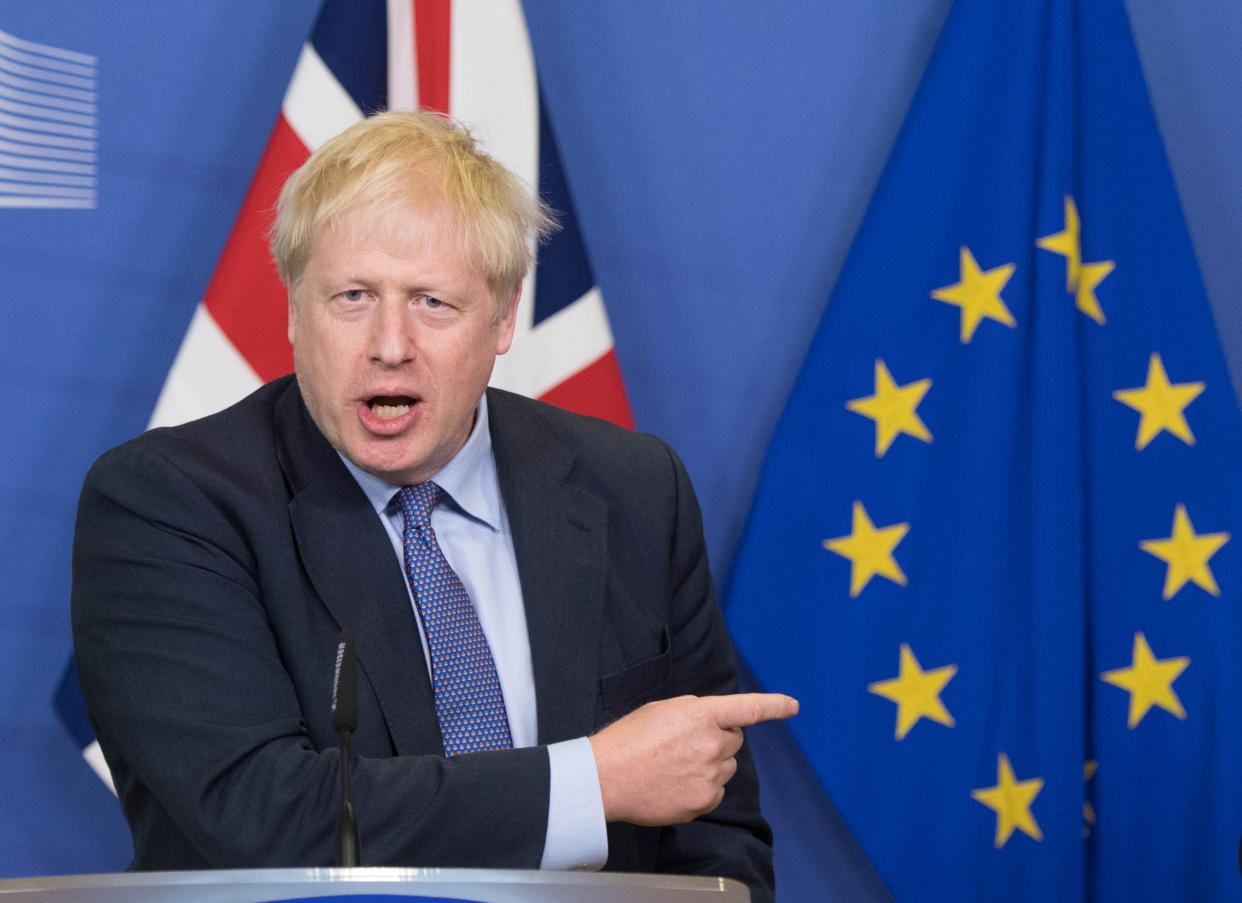What happens with Brexit after Saturday? Your transition questions answered

Brexit, in the infamous words of Boris Johnson, is about to get “done”.
But even when the UK leaves the EU at 11pm on Friday, the saga will be far from over.
On Saturday, the following day, Britain will enter into the “transition period”.
So, what is this - and what is at stake? Yahoo News UK take you through everything you need to know.
What is the transition period?
It’s an agreed period of time, set out in Mr Johnson’s Withdrawal Agreement, in which the UK will negotiate its future relationship with the EU.
Will the UK still be subject to EU customs?
Yes. It will still be a member of the single market and customs union. Freedom of movement will still apply. Britain will still be subject to EU law and European Court of Justice rulings.
All the while, it will have no say in EU decision-making.
So, how long will this last for?
The transition period ends on December 31, by which point an agreement with the EU must be in place.
Can the transition period be extended?
Yes, for up to two years. But the UK must give notice of this by June 30.

Mr Johnson, for his part, is adamant the transition period won’t be extended.
Matt Bevington, a UK-EU relations researcher from the UK in a Changing Europe group, tells Yahoo News UK: “The sole purpose of Boris Johnson will be to get a deal done and make it appear as if the negotiations are over.”
What is the main priority of the talks?
A free trade deal to ensure the UK is not subject to costly tariffs when trading with EU countries: one of the benefits, of course, of EU membership.
This is part of the reason why, in the words of Mr Bevington, the talks “will be very, very tricky”.
What else will be discussed?
Various other issues, such as security and fisheries, will have to be thrashed out. Much of the finer details remain unknown, however.
“Security wasn’t in the Conservative election manifesto at all,” Mr Bevington says. “We have heard very little from the government, whether we will be in any programmes.
“The political declaration says the UK can still attend informal meetings of EU ministers, which shows they do want us to be involved, but the UK has been quite quiet on this.”
What dangers does the transition period pose to the PM?
Mr Bevington points out: “A key political issue will be fisheries. The risk for the government comes if it wants to extend the transition.
“Then, the EU will be discussing the 2021 fishing quotas in October - and it would be the EU27 dictating quotas in UK waters.”
Mr Johnson enjoyed spectacular success in the general election, taking a number of traditionally Labour seats. Yet this could pose its own new ramifications for Number 10 depending on how the negotiations play out.

“A lot of the seats he won in the general election are in heavily manufacturing areas, and that will influence his thinking.
“The top 10 per cent of manufacturing areas now have a strong majority of Conservative MPs. They are now the party of manufacturing areas, and a customs union would have been very, very useful for these places.
“If we don’t reach an agreement on goods, it’s the manufacturing areas like the north-west that will suffer most.”
He added: “Food manufacturing is also important. We are a major food exporter.
“Look at whisky and salmon from Scotland: it all goes on the same route to Europe from Dover. It shows how the knock-on effects could reverberate around the county.”
How will the PM approach the talks?
Mr Bevington says: “I suspect there may be a battle almost immediately - with Boris Johnson trying to enforce his own timetable.”
However, Mr Johnson is unlikely to repeat the aggressive tactics he used in securing the Withdrawal Agreement in October last year.
“The likely approach is him not wanting to be as combative. He wants to relegate Brexit to the middle pages of the newspapers. He will want an agreement.”
What happens if an agreement isn’t reached by December 31?
The UK will then trade with the EU on World Trade Organisation (WTO) terms - the same as what a “no-deal” Brexit would have entailed. It would mean UK goods being subject to tariffs.
This would have major implications for UK business, Mr Bevington says.
“If an agreement is not reached, businesses will start to make firm decisions on the UK. If we are outside the customs union, with no trade agreement in place, that’s when they will decide.
“It’s why businesses will be looking for steers from the government to see how the negotiations are going.”
In terms of security, meanwhile, the Institute for Government says the UK “would have to rely on previous international conventions”.
Overall, just how hard will the negotiations be?
Mr Bevington warns: “There are all these different strands going on simultaneously, along with the implementation of the Withdrawal Agreement. All these issues at the same time makes for a very complicated picture.”
Finally, will the UK still have any ties to Europe once the transition period ends?
Yes. “People will have a sense we have left and can forget about the European Commission,” Mr Bevington says.
“But after Brexit, it can still bring cases against the UK for four years. That would come as quite a shock to the public - though it was written into the Withdrawal Agreement.”
Is your question not here? Let us know in the comments below.

